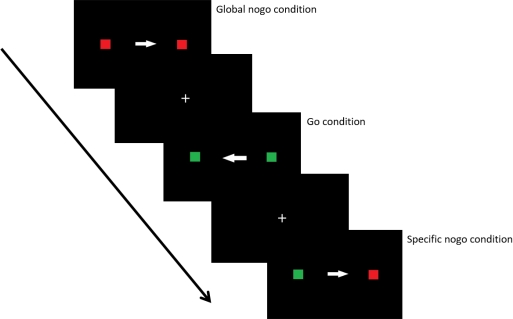Session Information
Date: Wednesday, June 22, 2016
Session Title: Cognition and Psychiatry
Session Time: 12:00pm-1:30pm
Objective: To evaluate the effect of dopaminergic medication on inhibitory control using a novel go/no-go task in Parkinson’s disease (PD). Global cognition and motor examination in the dopaminergic on and off state were tested as well.
Background: PD helps to study the involvement of the basal ganglia (BG) in cognitive and limbic domains. Patients show a variety of neuropsychiatric symptoms that are relevant in terms of prognosis and quality of life (Weintraub et al., 2011). Increased impulsivity under dopamine (DA) is observed in some PD patients (Dirnberger et al., 2013). Little is known though about the differential effects of DA on global versus specific no-go decisions which are thought to reflect the involvement of different BG pathways (Schroll et al., 2014).
Methods: Our novel paradigm contains 3 conditions  . The patient’s task is to choose the side where the arrow points on the green square. The conditions can be attributed to the direct (go), the indirect (global no-go) and the hyperdirect (specific no-go) BG pathway respectively. We tested 12 PD patients on and off their individual dopaminergic medication (mean age at symptom onset 53.9 yrs (SD 8.7); mean disease duration 8.8 yrs (SD 4.5)). Patients showed motor improvement with dopaminergic medication of at least 30% in the UPDRS III score (mean off = 30.75; mean on = 14.75). Global cognition was measured using the Montréal Cognitive Assessment (MoCA). Mean reaction time and error rates were calculated for each condition and compared using the Wilcoxon signed-rank test.
. The patient’s task is to choose the side where the arrow points on the green square. The conditions can be attributed to the direct (go), the indirect (global no-go) and the hyperdirect (specific no-go) BG pathway respectively. We tested 12 PD patients on and off their individual dopaminergic medication (mean age at symptom onset 53.9 yrs (SD 8.7); mean disease duration 8.8 yrs (SD 4.5)). Patients showed motor improvement with dopaminergic medication of at least 30% in the UPDRS III score (mean off = 30.75; mean on = 14.75). Global cognition was measured using the Montréal Cognitive Assessment (MoCA). Mean reaction time and error rates were calculated for each condition and compared using the Wilcoxon signed-rank test.
Results: The mean overall error rate of 11.8%. There were significantly more errors in the global no-go condition on dopaminergic medication compared to the off state (on: 5.1%; off: 1.8%; p= 0.028). No effect was seen in the specific no-go condition. MoCA scores didn’t show a significant change relative to DA.
Conclusions: Our data suggests that DA leads to an impairment of inhibitory control in the global but not in the specific no-go condition or in overall cognition in line with previous studies that show worsened no-go performance under DA (Moustafa et al., 2008) thought to be due to the lack of dips in DA in the indirect pathway (Frank, 2006; Schroll et al., 2014). It would be of interest if PD patients on deep brain stimulation in the Ncl. subthalamicus show an impairment of the specific no-go condition which more likely reflects processing along the hyperdirect pathway.
To cite this abstract in AMA style:
D. Kuebler, H. Schroll, R. Eva, A. Diepold, C. Meyer, A. Kuhn. The effect of dopamine on global versus specific inhibitory control in Parkinson’s disease [abstract]. Mov Disord. 2016; 31 (suppl 2). https://www.mdsabstracts.org/abstract/the-effect-of-dopamine-on-global-versus-specific-inhibitory-control-in-parkinsons-disease/. Accessed February 7, 2026.« Back to 2016 International Congress
MDS Abstracts - https://www.mdsabstracts.org/abstract/the-effect-of-dopamine-on-global-versus-specific-inhibitory-control-in-parkinsons-disease/
